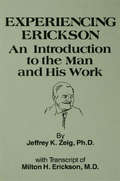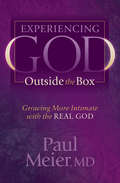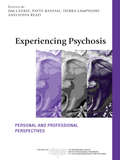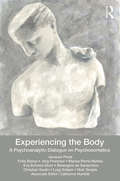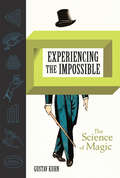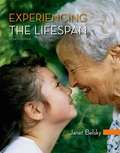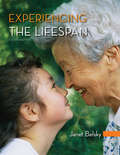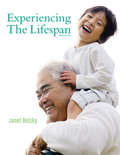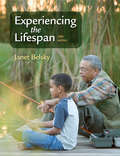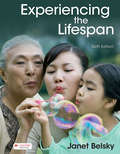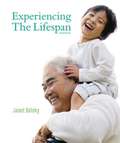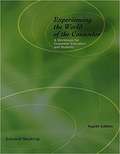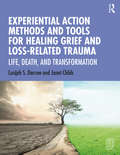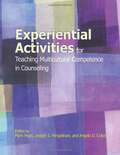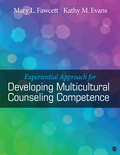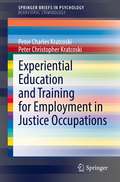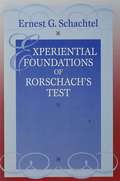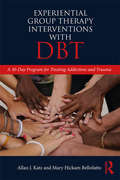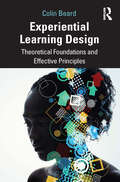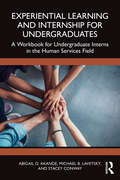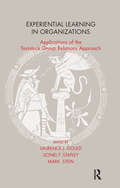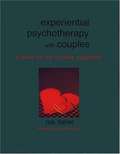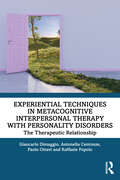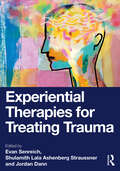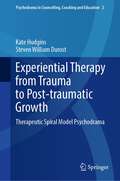- Table View
- List View
Experiencing Erikson
by Jeffery K. ZeigThe work and legacy of Milton H. Erickson, M.D. - his interpersonal approaches and techniques designed to liberate potentials for self-help in either the hypnotic or waking state - are having an increasing influence on numerous mental health professionals, as well as on the whole field of psychotherapy. Jeffrey K. Zeig, Ph.D., a leading practitioner and teacher of Ericksonian psychotherapy and a former student of Erickson's, who remained close with him until Erickson's death, has written a uniquely personal view of Erickson himself, his basic ideas and techniques, his contributions to psychotherapy, and his highly individual methods of teaching.
Experiencing God Outside the Box: Growing More Intimate with the Real God (Morgan James Faith Ser.)
by Paul Meier&“Paul Meier gives us the complete picture of how to [experience God as He truly is], spiritually, emotionally, relationally and neurologically.&” —Dr. John Townsend, psychologist and coauthor of the bestselling Boundaries Series The greatest calling we can have during our brief journey here on Planet Earth is to earnestly yearn and search, without prejudice, for an intimate relationship with the one and only true Creator God, outside the box. The vast masses of humans never get this deep and blindly believe whatever they have been taught about God, often out of fear of rejection by family or peers. Others see God as a Heavenly Version of their earthly fathers. Paul Meier, MD, is a psychiatrist and theologian whose books have been read by over seven million people in over thirty languages all around the world, and he describes the many prejudicial mountains that must be climbed to become intimate with the real God. Dr. Meier also gives many positive ways to assist you to make that earnest search for Experiencing God Outside the Box. &“This is an amazing book! It helped me see God in ways I never saw him before and to grow closer to him. It showed me many powerful ways to overcome the prejudices of my past.&” —Dr. Jean-Luc Bertrand, author and Emmy Award–winning TV producer &“Paul brings us face to face with many new facts and experiences that will hopefully enable us to re-think and &‘re-search&’ our relationship with God . . . This book will certainly help many find a new and more intimate relationship with the &‘real God&’ and Father of us all.&” —Esly Regina Carvalho, PhD, psychologist and author
Experiencing Psychosis: Personal and Professional Perspectives (The International Society for Psychological and Social Approaches to Psychosis Book Series)
by John Read Jim Geekie Patte Randal Debra LampshireExtensive scientific research has been conducted into understanding and learning more about psychotic experiences. However, in existing research the voice of subjective experience is rarely taken into consideration. In this book, first-person accounts are brought centre-stage and examined alongside current research to suggest how personal experience can contribute to professional understanding, and therefore the treatment, of psychosis. Experiencing Psychosis brings together a range of contributors who have either experienced psychosis on a personal level or conducted research into the topic. Chapters are presented in pairs providing information from both personal and research perspectives on specific aspects of psychosis including: hearing voices, delusional beliefs, and trauma as well as cultural, existential and spiritual issues. Experts from the field recognise that first and foremost psychosis is a human experience and that those who suffer from psychotic episodes must have some involvement in any genuine attempts to make sense of the experience. This book will be essential reading for all mental health professionals involved with psychosis. The accessible style and compelling personal histories will also attract service users and their families.
Experiencing the Body: A Psychoanalytic Dialogue on Psychosomatics
by Jacques PressExperiencing the Body: A Psychoanalytic Dialogue on Psychosomatics offers a range of perspectives on somatic illness, highlighting key points of convergence and difference between a range of psychoanalytic perspectives, to find a new understanding of this important issue. <P><P>Including contributions from experienced clinicians, each chapter presents contributions from two authors representing different points of view, before concluding with commentary from a third. It features discussion on key theoretical issues, including drive and affects, the role of the ideal ego, and the function of symbolisation, but also case studies of somatic patients, covering issues around depression and trauma, and exploring similarities and differences between somatic and borderline patients. Key treatment issues are also described such as psychosomatic investigation and the issue of transference and countertransference. <P><P>The result of a working party on psychosomatics of the European Psychoanalytical Federation, this unique book not only asks whether somatic illness arises from an impoverishment of the psyche or is primarily a form of communication through or by the body, but also tries to go beyond this classical opposition. It will appeal to any psychoanalyst or psychotherapist interested in this contentious and fascinating area.
Experiencing the Impossible: The Science of Magic
by Gustav KuhnHow the scientific study of magic reveals intriguing—and often unsettling—insights into the mysteries of the human mind. What do we see when we watch a magician pull a rabbit out of a hat or read a person's mind? We are captivated by an illusion; we applaud the fact that we have been fooled. Why do we enjoy experiencing what seems clearly impossible, or at least beyond our powers of explanation? In Experiencing the Impossible, Gustav Kuhn examines the psychological processes that underpin our experience of magic. Kuhn, a psychologist and a magician, reveals the intriguing—and often unsettling—insights into the human mind that the scientific study of magic provides. Magic, Kuhn explains, creates a cognitive conflict between what we believe to be true (for example, a rabbit could not be in that hat) and what we experience (a rabbit has just come out of that hat!). Drawing on the latest psychological, neurological, and philosophical research, he suggests that misdirection is at the heart of all magic tricks, and he offers a scientific theory of misdirection. He explores, among other topics, our propensity for magical thinking, the malleability of our perceptual experiences, forgetting and misremembering, free will and mind control, and how magic is applied outside entertaiment—the use of illusion in human-computer interaction, politics, warfare, and elsewhere. We may be surprised to learn how little of the world we actually perceive, how little we can trust what we see and remember, and how little we are in charge of our thoughts and actions. Exploring magic, Kuhn illuminates the complex—and almost magical—mechanisms underlying our daily activities.
Experiencing the Lifespan
by Janet BelskyExceptionally well-loved by instructors and students who've used it, Janet Belsky's text, written in her signature engaging style and voice, offers a fresh, remarkably brief way to understand the experience of human development throughout the lifespan. It gives students an immediate and practical grounding in the field's basic concepts, guiding them from underlying research to practical applications, in a highly conversational style, with pedagogy that reinforces learning, and with examples drawn from an extraordinarily broad range of cultures throughout the world. And with its dedicated version of Worth's online course space, LaunchPad, this edition becomes a fully integrated print/interactive resource. Visit Janet Belsky's site for updates from her blog, as well as teaching and research tips.
Experiencing the Lifespan
by Janet BelskyExceptionally well-loved by instructors and students who've used it, Janet Belsky's text, written in her signature engaging style and voice, offers a fresh, remarkably brief way to understand the experience of human development throughout the lifespan. It gives students an immediate and practical grounding in the field’s basic concepts, guiding them from underlying research to practical applications, in a highly conversational style, with pedagogy that reinforces learning, and with examples drawn from an extraordinarily broad range of cultures throughout the world. And with its dedicated version of Worth’s online course space, LaunchPad, this edition becomes a fully integrated print/interactive resource. Visit Janet Belsky's site for updates from her blog, as well as teaching and research tips.
Experiencing the Lifespan
by Janet BelskyExceptionally well-loved by instructors and students who've used it, Janet Belsky's text, written in her signature engaging style and voice, offers a fresh, remarkably brief way to understand the experience of human development throughout the lifespan. It gives students an immediate and practical grounding in the field's basic concepts, guiding them from underlying research to practical applications, in a highly conversational style, with pedagogy that reinforces learning, and with examples drawn from an extraordinarily broad range of cultures throughout the world. And with its dedicated version of Worth's online course space, LaunchPad, this edition becomes a fully integrated print/interactive resource. Visit Janet Belsky's site for updates from her blog, as well as teaching and research tips.
Experiencing the Lifespan
by Janet BelskyJanet Belsky’s Experiencing the Lifespan always reflects a scientist’s understanding of key research, a psychologist’s understanding of people, and a teacher’s understanding of students. This updated new edition features significant new findings, a broad-based global perspective, and enhanced media offerings. In a highly conversational style, with pedagogy that reinforces learning, and with examples drawn from an extraordinarily broad range of cultures throughout the world, the book remains at just the right length and level of coverage to fit comfortably in a single-term course.
Experiencing the Lifespan
by Janet BelskyExperiencing the Lifespan draws from a variety of cultures around the world to tell the story of human development, communicating the science and human impact of developmental psychology in a highly conversational style.
Experiencing the Lifespan (Third Edition)
by Janet BelskyWinner of the Textbook Excellence Award from the Text and Academic Authors Association, Janet Belsky’s Experiencing the Lifespan always reflects a scientist’s understanding of key research, a psychologist’s understanding of people, and a teacher’s understanding of students. This extensively updated new edition features significant new findings, a broad-based global perspective, and enhanced media offerings. With all of this, the book itself remains at just the right length and level of coverage to fit comfortably in a single-term course.
Experiencing the World of the Counselor: A Workbook for Counselor Educators and Students
by Edward NeukrugFilled with experiential exercises; vignettes on ethical, professional, and legal issues; self-assessment techniques; and other self-awareness activities, the workbook offers you an opportunity to examine your own life as you weave through the chapters.
Experiential Action Methods and Tools for Healing Grief and Loss-Related Trauma: Life, Death, and Transformation
by Lusijah S. Darrow Janet ChildsExperiential Action Methods and Tools for Healing Grief and Loss-Related Trauma introduces innovative psychodramatic and creative expression methods for helping those affected by bereavement and trauma. Each section focuses on a particular acute or secondary grief issue, providing supportive and explanatory material that can be given to clients, and experiential action methods for providers. Real-world vignettes and psychodrama tools delineate a unique approach to unlocking and shifting entrenched perspectives related to persistent grief and loss-related trauma, with chapters organized for practical use and application by counselors and therapists. The book also includes critical incident stress training material specifically for first responders, a frequently overlooked population. The practical guidance offered in this book will be of great interest to all who work with grief and trauma, including practicing and trainee psychologists and therapists, counseling centers, hospice organizations, bereavement support programs, and ministers.
Experiential Activities For Teaching Multicultural Competence In Counseling
by Mark Pope Joseph S. Pangelinan Angela D. CokerThis practical resource is intended for faculty teaching beginning and advanced multicultural counseling courses or other core classes who want to infuse issues of cultural diversity into the classroom. It contains 121 engaging and thought-provoking activities on a wide variety of multicultural topics such as defining diversity; barriers to effective cross-cultural counseling; cultural communication styles; identity development; oppression and discrimination; becoming a culturally skilled counselor; family counseling; and counseling specific cultural groups-which includes consideration of race, sexual orientation, age, ability, spirituality, and socioeconomic status. All activities are tied to the core content areas of the 2009 CACREP Standards, making this a perfect tool for the clinical training of counseling students. A CD-ROM with exercise handouts accompanies the spiral bound book for ease of copying and distribution in the classroom.
Experiential Approach for Developing Multicultural Counseling Competence
by Mary L. Fawcett Kathy M EvansThis text is an ideal companion for anyone preparing for a career in counseling or mental health, applicable to all core courses in the counseling curriculum and developmentally designed to build multicultural and diversity competencies from a beginning to advanced level. As a mental health- worker-in-training you will need to learn to work effectively with clients from diverse backgrounds, and this text provides a ready-made resource of multicultural and diversity activities to enhance your classroom learning. This book is structured around the nine core areas of the Multicultural Counseling Competencies (MCCs). These competencies are designated by the Council for Accreditation of Counseling and Related Educational Programs (CACREP) to help you learn the critical areas of personal and racial identity, develop an awareness of your own cultural values and biases (knowledge, awareness, and skills), and to build an understanding of both the counselor and client′s worldviews. The book devotes three final chapters to culturally appropriate intervention strategies that again strengthen your awareness, knowledge, and skills.
Experiential Education and Training for Employment in Justice Occupations (SpringerBriefs in Psychology)
by Peter Christopher Kratcoski Peter Charles KratcoskiThis brief discusses the benefits and various considerations for participants and justice agencies involved in experiential programs for students. Using case studies and interviews with justice agency administrators, it assesses programs in law enforcement, courts, corrections, and public and private human services agencies. Each chapter discusses how to prepare for the internship, the expectations of the field work, and practical concerns. This brief is appropriate for students in justice studies, criminology and related programs, and for professionals coordinating experiential education.
Experiential Foundations of Rorschach's Test
by Ernest G. SchachtelSchachtel shared with his great contemporary David Rapaport the goal of scientifically reframing the psychoanalytic understanding of personality. Experiential Foundations of Rorschach's Test, first published in 1966, is in one sense Schachtel's extended dialogue with Rapaport (in the guise of Schachtel's interlocutor) about this ambitious task. In the course of his brilliant and lucid meditation on this topic, Schachtel attempted far more than the simple explication of particular test responses. His book contains, and should be read as, an entire theory of personality considered in terms of the ways in which one person may meaningfully and detectably differ from another.
Experiential Group Therapy Interventions with DBT: A 30-Day Program for Treating Addictions and Trauma
by Allan J. Katz Mary Hickam BellofattoExperiential Group Therapy Interventions with DBT provides group and individual therapists with proven experiential exercises that utilize dialectical behavior therapy (DBT) skills and original educational topics and have been successfully used nationwide to help treat patients with addiction and trauma. It introduces the advantages of using experiential therapy to facilitate groups for trauma and addiction and explains how DBT can help in regulating emotions and tolerating stress. This workbook contains concise plans and exercises for facilitating a group for a 30-day cycle. There is a theme for each day, original psychoeducational materials, experiential exercises, warm ups, and closing interventions.
Experiential Learning Design: Theoretical Foundations and Effective Principles
by Colin BeardExperiential Learning Design comprehensively demonstrates the key theories and applications for the design of experiential approaches to learning and training. Learning is gradually moving away from management and delivery of content, and toward experiences that encourage learners to engage and take greater responsibility for their own progress. This book’s empirically sound, multi-disciplinary approach balances technical-rational and artistic-intuitive design elements to accommodate the complex, fluctuating capacities of human learning. In-depth chapters cover design principles, social and environmental factors in learning, the importance of senses and emotions, and links between body and brain. This bold, unique perspective shift will enrich the work of learning scientists, instructional designers, educational technologists, and beyond.
Experiential Learning and Internship for Undergraduates: A Workbook for Undergraduate Interns in the Human Services Field
by Abigail O. Akande Michael B. Lavetsky Stacey ConwayThis textbook is a comprehensive and sequential guide designed specifically for undergraduate students entering internships in the human services field and for the faculty serving as their internship supervisors. With a strong focus on career development and self-exploration, it builds understanding of the theoretical knowledge and core competencies needed for practical, clinical experience in a variety of human services positions such as rehabilitation, social work, case management, counseling, and criminal justice.Through a variety of exercises and activities in an effective workbook format, this book assists student interns in developing a better sense of self in relation to their career readiness and helps them to identify career paths in the human services field. It goes on to support them in developing the soft skills necessary to navigate professional careers and gives guidance on how to secure undergraduate internships in the human services field. The book focuses on how to develop the tools needed to succeed, from counseling skills, case management, and crisis management to ethical conduct, multicultural considerations, self-care, legislation, and working under supervision. It is accompanied by downloadable versions of all the exercises and activities which will be available for instructors using this book as a course text.By targeting the career exploration content that is vital in the experience of undergraduates who are seeking professions in such a broad human services field, it will be essential reading for students at this level. It is also a valuable resource for internship or practicum instructors in undergraduate programs, with a focus on rehabilitation, human services, social work, psychology, criminal justice, and other related helping fields.
Experiential Learning in Organizations: Applications of the Tavistock Group Relations Approach
by Laurence J. GouldThis book shows the ways in which the boundaries of the basic group relations training conference model of experiential learning have been extended to provide creative, conceptual, and applied links to both management and group and organizational education, training, and consultancy practice.
Experiential Psychotherapy With Couples: A Guide for the Creative Pragmatist
by Rob Fisher Ron KurtzCouple psychotherapy can be significantly deepened and expedited by using present-time experience in the assessment process and by incorporating experiential interventions, says Fisher.
Experiential Techniques in Metacognitive Interpersonal Therapy with Personality Disorders: The Therapeutic Relationship
by Giancarlo Dimaggio Raffaele Popolo Paolo Ottavi Antonella CentonzeThis book provides a guide to using experiential techniques, such as imagery rescripting, chairwork, body work, and mindfulness in metacognitive interpersonal therapy to treat personality disorders and PTSD, along with their many comorbid conditions.Psychotherapy for patients with personality disorders and their associated symptom disorders needs (1) a tailored case formulation, continuously updated and shared with the patient; (2) the use of experiential techniques to challenge embodied, automatic, hard-to-change interpersonal patterns; and (3) active attention to the therapeutic relationship. This book will help readers work along these dimensions, acting as a guide to constructing a client-first model of their own psychological functioning that can be used as a roadmap to change. It includes specific procedures for addressing problems in the therapeutic contract, devising and enacting imagery rescripting and other techniques, interrupting repetitive thinking, and so on. It also includes real case examples, with rich and detailed clinical exchanges for the procedures described.This comprehensive text will help practicing clinicians of any orientation in working with patients suffering from personality disorders and their associated symptoms.
Experiential Therapies for Treating Trauma
by Shulamith Lala Ashenberg Straussner Jordan Dann Evan SenreichExperiential Therapies for Treating Trauma offers 17 chapters, with 15 of them focusing on a different experiential psychotherapy for treating trauma, written by clinicians with expertise in that modality. No other book contains descriptions of such a wide array of experiential therapies under one cover. Readers will obtain both a comprehensive overview of the many experiential therapies that are currently utilized and specific knowledge regarding how to utilize each of them in psychotherapy practice. The authors of each chapter emphasize that in working with clients impacted by trauma, there is a need for the use of therapeutic modalities that go beyond the cognitive processes central to talk therapy and incorporate more holistic, sensory approaches that emphasize the building of a strong relationship between the client and therapist. Both experienced clinicians and students will find this book to be an invaluable resource to enhance their knowledge of how to use experiential therapies and to motivate them to obtain advanced training in modalities that spark their interest.
Experiential Therapy from Trauma to Post-traumatic Growth: Therapeutic Spiral Model Psychodrama (Psychodrama in Counselling, Coaching and Education #2)
by Kate Hudgins Steven William DurostTherapeutic Spiral Model (TSM) psychodrama is an innovative three stage system of clinically modified psychodrama to treat trauma safely and effectively. This book presents the theoretical evolution of the Therapeutic Spiral Model from a Western model of early trauma-informed therapy to the worldwide system of experiential change that it is today. This book demonstrates the anchor of classical psychodrama theory and methods modified by clinical observations and awareness of current theories about trauma and how it effects the brain, See the evolution from 1992 to its present structures. It provides an accessible practice manual of using TSM psychodrama to promote trauma recovery in many cultures, countries, languages and settings. It presents a unique clinical map for intra-psychic experiential trauma therapy connecting classical psychodrama to TSM psychodrama. It demonstrates psychological concepts like projective identification and information from neurobiology for trauma repair in individual and group settings with action methods. The book shows easy-to-understand visual images such as trauma bubbles, therapeutic spirals and the autonomous healing center to help communicate internal states of spontaneity. The authors draw on their own rich experiences teaching TSM psychodrama in the global community and share stories of people’s recovery around the world. The audience for this publication includes trainers, practitioners, psychotherapists, trauma workers, and researchers working in a broad array of disciplines and human services.
